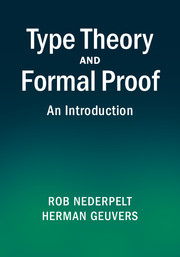Book contents
- Frontmatter
- Contents
- Foreword
- Preface
- Acknowledgements
- Greek alphabet
- 1 Untyped lambda calculus
- 2 Simply typed lambda calculus
- 3 Second order typed lambda calculus
- 4 Types dependent on types
- 5 Types dependent on terms
- 6 The Calculus of Constructions
- 7 The encoding of logical notions in λC
- 8 Definitions
- 9 Extension of λC with definitions
- 10 Rules and properties of λD
- 11 Flag-style natural deduction in λD
- 12 Mathematics in λD: a first attempt
- 13 Sets and subsets
- 14 Numbers and arithmetic in λD
- 15 An elaborated example
- 16 Further perspectives
- Appendix A Logic in λD
- Appendix B Arithmetical axioms, definitions and lemmas
- Appendix C Two complete example proofs in λD
- Appendix D Derivation rules for λD
- References
- Index of names
- Index of definitions
- Index of symbols
- Index of subjects
7 - The encoding of logical notions in λC
Published online by Cambridge University Press: 05 November 2014
- Frontmatter
- Contents
- Foreword
- Preface
- Acknowledgements
- Greek alphabet
- 1 Untyped lambda calculus
- 2 Simply typed lambda calculus
- 3 Second order typed lambda calculus
- 4 Types dependent on types
- 5 Types dependent on terms
- 6 The Calculus of Constructions
- 7 The encoding of logical notions in λC
- 8 Definitions
- 9 Extension of λC with definitions
- 10 Rules and properties of λD
- 11 Flag-style natural deduction in λD
- 12 Mathematics in λD: a first attempt
- 13 Sets and subsets
- 14 Numbers and arithmetic in λD
- 15 An elaborated example
- 16 Further perspectives
- Appendix A Logic in λD
- Appendix B Arithmetical axioms, definitions and lemmas
- Appendix C Two complete example proofs in λD
- Appendix D Derivation rules for λD
- References
- Index of names
- Index of definitions
- Index of symbols
- Index of subjects
Summary
Absurdity and negation in type theory
In Section 5.4, IV, we saw how implication can be coded in type theory (in particular, in λP). We recall: by coding the implication A ⇒ B as the function type A → B, we mimic the behaviour of ‘implication’, including its introduction and elimination rule, in type theory. So we also have minimal propositional logic in λC, since λP is part of λC.
In order to get more than minimal propositional logic, we have to be able to handle more connectives, such as negation (‘¬’), conjunction (‘∧’) and disjunction (‘∨’). This cannot be done in λP, but in λC there exist very elegant ways to code the respective notions, as we presently show.
We start with negation. It is natural to consider the negation ¬A as the implication A ⇒ ⊥, where ⊥ is the ‘absurdity’, also called contradiction. So we interpret ¬A as ‘A implies absurdity’. But for this we first need a coding of the absurdity itself. (In Exercises 3.5 and 6.1 (a) we already mentioned codings of ⊥ in λ2 and λC, which we shall justify below.)
I. Absurdity
A characteristic property of the proposition ‘absurdity’, or ⊥, is the following:
If ⊥ is true, then every proposition is true.
In natural deduction this property is known under the name ⊥-elimination.
Information
- Type
- Chapter
- Information
- Type Theory and Formal ProofAn Introduction, pp. 137 - 164Publisher: Cambridge University PressPrint publication year: 2014
